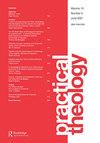Lay pastoral care: a narrative approach
IF 0.4
0 RELIGION
引用次数: 0
Abstract
something that will better form them for future ministry. Part three contains two reflections by practitioners to demonstrate how practical theology can resource evangelicals to participate in the public sphere without negating their own theology, which has traditionally led to withdrawal. Examples of such engagement are the political issues surrounding relationship and sex education in schools, as suggested by Olwyn Mark, or through organising different types of community groups, which Matt Spencer advocates through community choirs. Reflections by current students, in part four, include the leading of Bible study groups (Isaac McNish), ‘theodrama’ and relativism in secular and ecclesial cultures (Samuel Norman), an encounter between a hospice chaplain and a patient (Fiona Moore), and ethnographic research on Pentecostal doctrines (Sheryl Arthur). Through the inclusion of these student voices, this part demonstrates that a new generation of scholars are emerging who will build on the somewhat limited prior engagement between the discipline and their evangelical tradition. In part five, Mark Cartledge provides an overview of the current evangelical practical theology. In doing so, he reiterates the themes that run throughout this book: that evangelicals have generally not engaged with the wider practical theological academy (p.207) and, those who have, generally have not drawn constructively on their tradition (p.209). By doing so, evangelicals are urged to be confident in their distinctives whilst employing practical theological methods, as by doing so they can provide insights for the wider discipline to consider. Due to the length of this book, and by the editors’ own admission in their conclusion, it has limitations in that it lacks engagement with some streams of evangelicalism and has a singular focus on UK scholarship (p.204). Therefore, whilst it brings some clarity as to how evangelicals have engaged, it is perhaps best viewed as a work that will promote further dialogue rather than describing the entirety of the current conversation. However, due to its breadth, this book will be of interest to a wide range of teachers, students, and practitioners. Evangelicals will be particularly interested as it resonates with their wider theological tendencies, especially with regards to their high view of scripture and their reluctance to value human experience as equal to other theological sources. Whilst some non-evangelical practical theologiansmay bewary of these tendencies entering into the discipline, this book will help them gain a deeper understanding, and hopefully more appreciation, of why evangelicals do practical theology in their distinct ways.田园关怀:叙事方法
这对他们将来的事工有更好的帮助。第三部分包含实践者的两个反思,以证明实践神学如何能够为福音派参与公共领域提供资源,而不会否定他们自己的神学,这在传统上导致了退缩。这种参与的例子是围绕学校关系和性教育的政治问题,正如Olwyn Mark所建议的那样,或者通过组织不同类型的社区团体,Matt Spencer通过社区唱诗班倡导。第四部分是当前学生的反思,包括圣经学习小组的领导(艾萨克·麦克尼什),“神剧”和世俗文化和教会文化中的相对主义(塞缪尔·诺曼),临终关怀牧师和病人之间的相遇(菲奥娜·摩尔),以及五旬节教义的民族志研究(谢丽尔·亚瑟)。通过这些学生的声音,这一部分表明新一代的学者正在崛起,他们将建立在学科和福音派传统之间有限的先前接触的基础上。在第五部分,马克·卡特利奇概述了当前福音派的实践神学。在这样做的过程中,他重申了贯穿全书的主题:福音派通常没有与更广泛的实用神学院接触(第207页),而那些接触过的人,通常没有建设性地借鉴他们的传统(第209页)。通过这样做,福音派被敦促在使用实用的神学方法的同时对自己的独特性充满信心,因为这样做他们可以为更广泛的学科提供见解。由于这本书的篇幅,编辑们自己在结论中也承认,它有局限性,因为它缺乏对福音主义一些流派的参与,并且只关注英国的学术(第204页)。因此,虽然它对福音派教徒的参与方式提供了一些清晰的信息,但它可能最好被视为一部促进进一步对话的作品,而不是描述当前对话的全部内容。然而,由于它的广度,这本书将是广泛的教师,学生和从业者的兴趣。福音派教徒会特别感兴趣,因为它与他们更广泛的神学倾向相共鸣,尤其是他们对圣经的高度评价,以及他们不愿将人类经验与其他神学来源同等看待。虽然一些非福音派的实践神学家可能会对这些进入学科的倾向有所警惕,但这本书将帮助他们更深入地理解,并希望更多地欣赏为什么福音派以他们独特的方式做实践神学。
本文章由计算机程序翻译,如有差异,请以英文原文为准。
求助全文
约1分钟内获得全文
求助全文

 求助内容:
求助内容: 应助结果提醒方式:
应助结果提醒方式:


